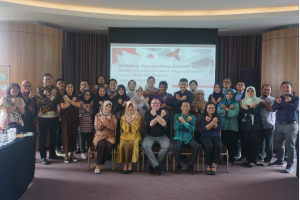Industry Decarbonisation
"Empowering Industry for a Carbon-Smart Future"
Advancing Indonesia’s industrial sectors towards a low-carbon future, emphasising renewable energy integration and enhanced energy efficiency for sustainable growth.
Mission Statement
GIZ supports Indonesia’s green economic transformation and industrial decarbonization through the integrated application of renewable energy (RE) and energy efficiency (EE).
Why?
Indonesia is the largest economy in ASEAN and the 16th largest economy in the world. With its Vision 2045, Indonesia is aiming to become a fully industrialised nation and shift towards a green economy by 2045. Expanding the industry and manufacturing sectors in a carbon-friendly way, decoupling economic growth from energy demand rise and greenhouse gas (GHG) emissions is pivotal to enable such a transformation. By today, Industry plays an important role in Indonesia’s economy. It contributes 16.77% to the national GDP, 28.3% to overall tax revenue, 71.04% to exports and 41.14% to the country’s investment in Q1 2023 (Ministry of Industry, 2023). In turn, these significant shares are reflected in the industry’s contribution to overall emissions, where industry accounted for one quarter of total emissions in 2022 (IEA). The top four industrial sectors that produce the highest emission levels are: cement, steel or fabricated metal, textile and apparel, food and beverages. A key source of emissions in industry is high-energy consumption.
Recognizing the need to reduce industrial emissions to realise the vision of a green economy, Indonesia’s NDC calls for 9 Mton CO2eq emission reductions for the Industrial Processes and Product Use (IPPU) sector. However, existing options to increase the efficiency of industrial energy-related processes and adopting lower carbon technologies are widely un-utilized. Emerging as first movers for green transformation are industry players and private sector stakeholders who show signs of becoming champions for a move towards net zero industry decarbonization, aligned with internationally driven obligations to green supply chains in light of Carbon Border Adjustment Mechanisms (CBAM).
What?
With whom?
GIZ collaborates at national level with the MEMR as political partner and the subordinated Directorate General of Renewable Energy and Energy Conservation (DG EBTKE) as implementation partner on industry decarbonization. Concerned directorates are the ones for New and Renewable Energy, as well as for Energy Conservation who are responsible for upscaling the use of RE and wide application of energy conservation measures and strategies across all industries. Further important partner ministries are the MoI for setting industrial standards for energy use and supply (Centre for Green Industry; others), as well as the Ministry of Marine Affairs and Fisheries (KKP) for the development of solar cold chains across industrial cold storages.
Besides the Government, GIZ works closely with implementation partners including IESR, WRI Indonesia, international research organisations such as Fraunhofer ISI for applied research and international knowledge sharing. To realise a pilot approach, GIZ further works with associations such as KADIN and other relevant industry associations to reach out to potential industrial champions that seek to transform their industry in line with a NZE target.
How?
- Policy advisory for MEMR (EBTKE), MoI and KKP on energy efficiency and renewable energy for industry
- Capacity building for corporates on energy management and the financial sector on sustainable energy finance
- Matchmaking between private sector stakeholders/industries, technology providers and investors
- Energy audits and techno-economic pre-feasibility studies
- Demonstration projects/first movers: Industry Champions, NZE City Pioneers, and Solar Cold Storages and related Supply Chains
When?
GIZ supports the targets outlined by the Government of Indonesia towards NZE 2060, and the JETP targets by 2030. This entails the following success indicators:
- Company pledges for CO2 emission reductions and net-zero strategy development and implementation
- Number of international technology partnerships between applied research, industry, academia, and other actors
- Partner contributions leveraged, measured in monetary contributions
- Tons of CO2 mitigated (Standard Indicator)
Who?
- Topic Leads: Johannes Anhorn, Frank Stegmüller
- Thematic Experts: Jaka Kelana (Industrial Decarbonization), Satrio Prillianto (Green Hydrogen), Ardian Candraputra / Andreas Kristiawan (Bioenergy/Biomethane)


